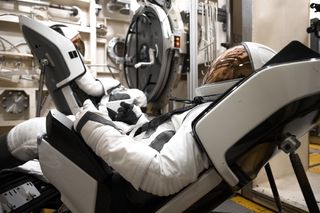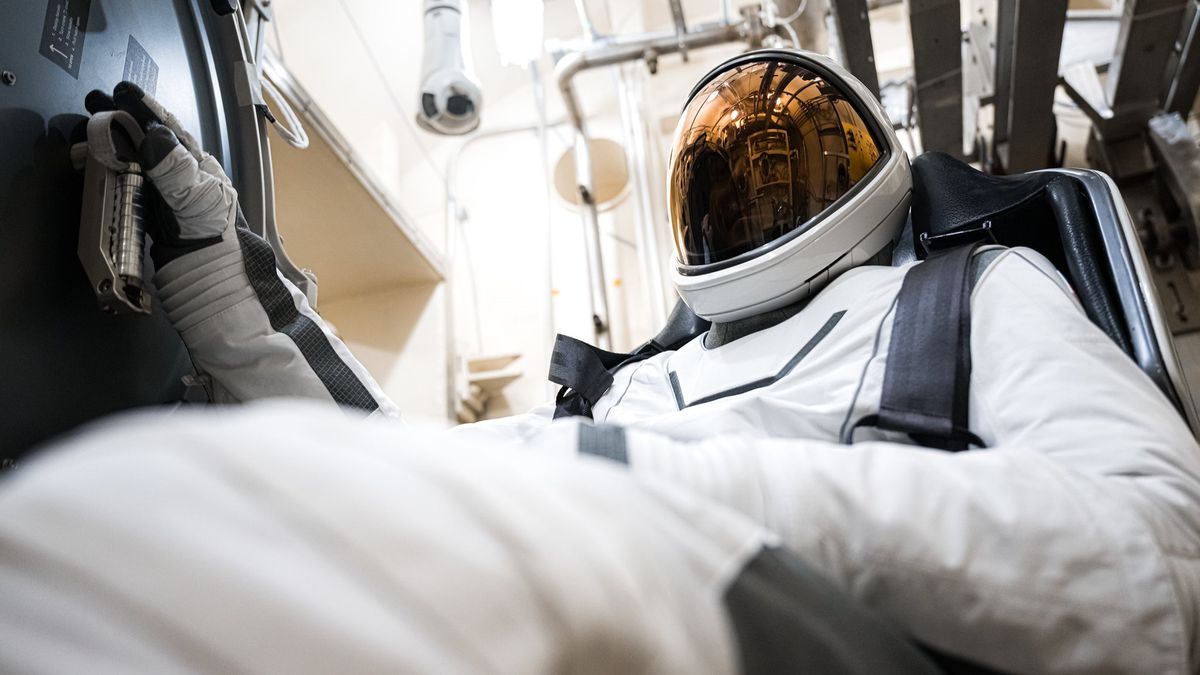This first ever private spacewalk will be bringing some serious style to outer space.
SpaceX’s privately-funded crewed mission, Polaris Dawn, is moving toward a launch sometime this summer. The four-person crew, which includes the mission’s funder, billionaire philanthropist Jared Isaacman, recently completed acceptance testing for SpaceX’s new extravehicular activity (EVA) spacesuits, which they will wear as they become the first private citizens to perform a spacewalk on orbit.
In addition to Isaacman, the crew includes two lead operations engineers at SpaceX, Sarah Gillis and Anna Menon, serving as mission specialists, and the mission pilot, retired United States Air Force Lieutenant Colonel Scott “Kidd” Poteet. Training for their upcoming mission has included hands-on work developing SpaceX’s new EVA suit, which recently reached its last major developmental milestone test as the crew donned their suits in a vacuum for the first time.
“The Polaris Dawn crew recently completed a series of spacesuit acceptance tests in preparation for the mission’s extravehicular activity,” reads an update on the mission website. Wearing their EVA suits in a vacuum for the first time allowed SpaceX to collect a number of different data ahead of the crew’s upcoming mission, when they will wear the suits in the vacuum of space.
According to the Polaris website, the vacuum environment allowed SpaceX to collect a number of data on what to expect during an actual EVA:
- “Familiarization with how the spacesuit performs in a vacuum;
- Collection of spacesuit and biometric data to assess the overall system’s performance in a flight-like environment;
- Understanding of general impacts of pressure changes on their body during pressurized operations;
- Insight into the various thermal states expected throughout the spacewalk; and
- An elevated metabolic period for the crew to simulate the expected workload during the spacewalk, as well as a reduced-activity period to understand the trend of body temperatures throughout the operation”
A number of photos from the test were posted to the Polaris Porgram’s Flickr account, showing off SpaceX’s sleek new, albeit familiar, spacesuit design. Polaris Dawn is a follow-up mission to SpaceX’s first private astronaut launch, Inspiration4, aslo funded by Isaacman, and the first of three potential missions for the Polaris Program. Each will help raise money for the pediatric cancer research center St. Jude Children’s Research Hospital.
Related: SpaceX reveals new EVA suit for 1st private spacewalk on upcoming Polaris Dawn spaceflight (video)

The first images of SpaceX’s EVA suit, which, on the outside, looks like a bulkier version of their intravehucliar actitivy (IVA) suits — pressure suits worn during launch and landing of a spacecraft, but not designed to operate in the exposed vacuum of space — were revealed on the company’s website May 4.
But Polaris Dawn’s new images from the recent tests highlight some of the differences between the IVA and EVA suits.

The suit’s helmet, particularly, has received some upgrades, including a new heads-up display for astronauts to view data such as their suits’ internal pressure, temperature and humidity. SpaceX’s EVA suits also contain new insulation materials and joint improvements for increased mobility and temperature control.
Related: Meet the four private Polaris Dawn astronauts SpaceX will launch into orbit this year

Polaris Dawn is scheduled to last five days, and will involve almost 40 different science experiments for the crew to conduct while in space, including testing the new EVA suits and the capabilities of their Crew Dragon spacecraft while exposed to the vacuum.
We are targeting no earlier than July 31 for the launch of Polaris Dawn pic.twitter.com/gVicWmMNE5July 3, 2024
The Polaris team had been targeting no earlier than July 31 for the launch of their historic mission, according to a July 3 post on X, but that date may be highly tentative after a recent incident during the launch of a set of SpaceX Starlink satellites.

A July 11 launch of a SpaceX Falcon 9 rocket carrying 20 additions to the company’s satellite internet megaconstellation ended in failure, with the second stage experiencing a phenomon that led to a catestrophic loss of the entire payload. As a result, all Falcon 9 launches have been put on hold, pending the results of investigations from SpaceX and the Federal Aviation Administration (FAA).
The grounding of the Falcon 9 may also have implications for NASA’s upcoming missions to the International Space Station (ISS), which was slated to launch both a cargo mission and a crewed mission to the space station in the coming months.




















Discussion about this post